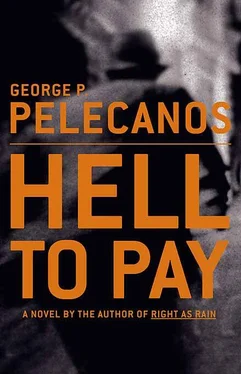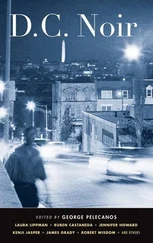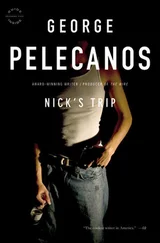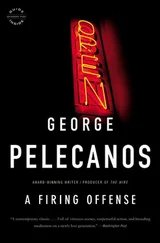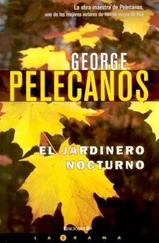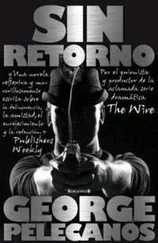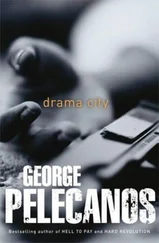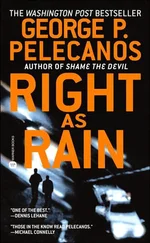On the way over to the Three-Star Diner, going east on Kennedy, Strange noticed the Mercedes, once again, in his rearview. The tricked-out car was only two lengths back. They’re not even worried about being burned, thought Strange, and for one young moment he considered taking a sudden turn and punching the gas. He could lose them easily; he’d come up around here, and no one knew these streets and alleys like he did. But he let them follow him, all the way down to First, where he parked his Caddy in a space along the curb. The Mercedes pulled up behind him.
Strange locked his Brougham and walked toward the Mercedes, memorizing the car’s license plate and confirming the model as he approached. Strange reached the car as the driver’s-side window slid down. Behind the wheel was a handsome, typically unfriendly looking young man with close-cropped hair. His suit and the knot of his tie were immaculate. Strange recognized him as one of the men who had attended Joe Wilder’s funeral. He had been talking to Joe’s mother, Sandra Wilder, by the grave.
In the passenger bucket was a man of the same age, same unsmiling expression, more flashily dressed. He sat low, with one arm leaning on the sill of his window, talking on his cell.
“What can I do for you fellas?” said Strange.
“A man needs to speak with you,” said the driver.
“Who?”
“Granville Oliver.”
Strange knew the name. The city knew Granville Oliver’s name. But with Strange it was more; he had a history with Oliver’s bloodline.
“And you are?”
“Phillip Wood.”
Wood’s partner lowered the cell and looked across the buckets at Strange. “Granville wants to see you now .”
Strange did not acknowledge this one or give him any kind of eye contact at all. He glanced over his shoulder through the plate glass fronting the diner. He could see Billy Georgelakos coming around the counter, his girth pushing against his stained apron, holding the pine baton that Strange knew had been hollowed out and filled with lead. Strange shook his head slightly at Billy, who stopped his forward path at once. Strange returned his gaze to the driver, Phillip Wood.
“Tell you what,” said Strange. “I’m gonna go on in there and eat my breakfast. When I come out, y’all are still out here? We can talk.”
Strange gave them his back, left the idling Mercedes curbside, and walked into the Three-Star. The sound of gospel music, coming from the house radio, hit him like cool water as he entered the diner.
“Everything all right, Derek?” said Georgelakos, now behind the counter again.
“I think so.”
“The usual?”
“Thanks, friend,” said Strange.
STRANGE ate a feta-cheese-and-onion omelette sprinkled with Texas Pete hot sauce, and a half-smoke side, and washed it down with a couple of cups of coffee. Some after-church types were at the counter and some sat in the old red-cushioned booths. The diner was white tiles and white walls, kept clean by Billy and his longtime employee, Etta.
Billy Georgelakos, his bald head sided by patches of gray, ambled down the rubber mat that ran behind the counter and leaned his forearms on the Formica top.
“Where’s Janine and the boy?”
“Busy,” said Strange, sopping up the juice left on the plate with a triangle of white toast.
“Uh,” grunted Georgelakos. His great eagle nose twitched. His glance moved through the window to the street, then back to Strange. “What about it? They’re waiting for you, right?”
“I told them to wait,” said Strange. He closed his eyes as he swallowed the last of his breakfast. “Billy, you can’t get a better egg and half-smoke combination in all of D.C. than you can right here.”
“The omelette was my father’s recipe, you know that. But your father taught us all how to grill a half-smoke.”
“However it happened, it’s beautiful music, that’s for damn sure.”
“You sure you gonna be all right?”
“Pretty sure. Lemme see your pen.”
Georgelakos drew his Bic from where it rested atop his ear. Strange wrote something down on a clean napkin he pulled from a dispenser.
“In case I’m wrong,” said Strange, “here’s the license plate number of their car. It’s a C two thirty, a two thousand model, in case it comes up.”
Georgelakos took the napkin, folded it, and slipped it under his apron. Strange left money on the counter and shook Georgelakos’s hand.
On the way out, Strange stopped by the photograph of his father, Darius Strange, wearing his chef ’s hat and standing next to Billy’s father, Mike Georgelakos, in the early 1960s. The photograph was framed and mounted by the front door. He stared at it for a few moments, as he always did, before reaching for the handle of the door.
“ Adio , Derek,” said Georgelakos.
“ Yasou, Vasili ,” said Strange.
OUT on the street, Strange stood before the open window of the Mercedes.
“Get in,” said Phillip Wood.
“Where we goin’?”
“You’ll find out, chief,” said Wood’s partner.
Strange looked at Wood only. “Where?”
“Out Central Avenue. Largo area.”
“I’ll follow you out,” said Strange, and when Wood didn’t answer, Strange said, “Young man, it’s the only way I’ll go.”
Wood’s partner laughed, and Wood stared at Strange some more in that hard way that was not working on Strange at all.
“Follow us, then,” said Wood.
Strange went to his car.
STRANGE followed the Mercedes east to North Capitol, then south, then east again on H to Benning Road. Farther along they found Central Avenue and took it out of the city and into Maryland.
As he drove, Strange mentally recounted what he knew of Granville Oliver.
Oliver, now in his early thirties, had come up fatherless in the Stanton Terrace Dwellings of Anacostia, in Southeast D.C. His mother was welfare dependent and a shooter of heroin and cocaine. When he was eight years old, Granville had learned how to tie his mother off and inject her with coke, a needed jolt when her heroin nods took her down to dangerously low levels. He was taught this by one of her interchangeable male friends, hustlers and junkheads themselves, always hanging around the house. One of these men taught him how to go with his hands. Another taught him how to load and fire a gun. At the time, Granville was nine years old.
Granville had an older brother, two cousins, and one uncle who were in the game. Cocaine at first, and then crack when it hit town around the summer of ’86. The brother was executed in a turf dispute involving drugs. The cousins were doing time in Ohio and Illinois prisons, dispersed there after the phase-out of Lorton. Granville’s mother died when he was in his early teens, an overdose long overdue. It was the uncle, Bennett Oliver, who eventually took Granville under his wing.
Granville dropped out of Ballou High School in the tenth grade. By then he was living in a row house with friends in Congress Heights, south of Saint Elizabeth’s. He had been a member of the notorious Kieron Black Gang in the Heights, but it was small change, a you-kill-one-of-us-and-we-kill-one-of-you thing, and he wanted out. So Granville went to his uncle, who took him on.
From the start it was apparent that Granville had a good head for numbers. After he had proven himself on the front lines – he was allegedly the triggerman in four murders by the time he was seventeen years old – he quickly moved into operations and helped grow the business. Through ruthless extermination of the competition, and Granville’s brains, the Oliver Mob soon became the largest crack and heroin distribution machine in the southeast quadrant of the city.
The center of the operation was a small rec center anchoring a rocky baseball field and rimless basketball court on the grounds of an elementary school in the Heights. There Bennett and Granville got to know the kids from the surrounding neighborhoods of Wilburn Mews, Washington Highlands, Walter E. Washington Estates, Valley Green, Barnaby Terrace, and Congress Park.
Читать дальше
